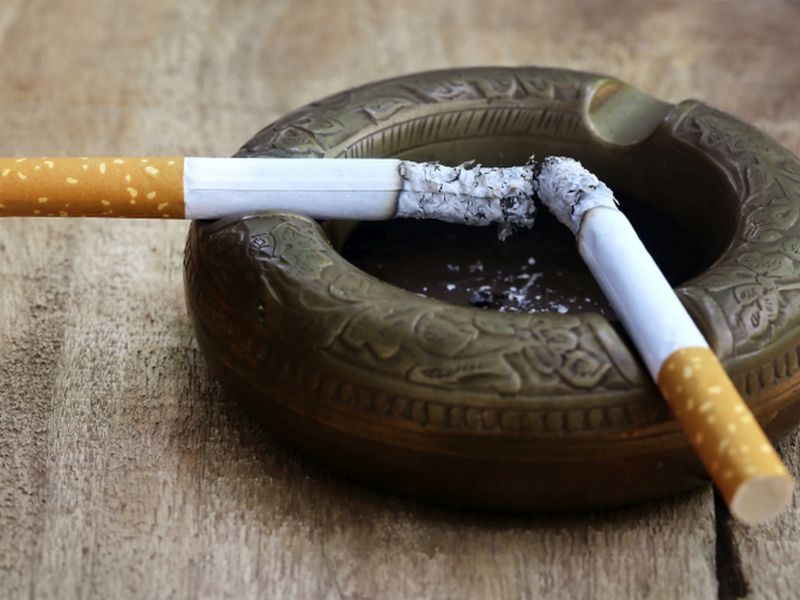Does Parents' Smoking Raise Future Heart Risks for Kids?
By Amy NortonHealthDay Reporter

MONDAY, Sept. 23, 2019 (HealthDay News) -- When parents smoke, their kids may face a higher risk of a common heart rhythm problem decades later, a new study suggests.
Researchers found that adults who grew up with smokers were more likely to develop atrial fibrillation, versus those with nonsmoking parents.
Atrial fibrillation (or "a-fib") is a heart arrhythmia in which the atria -- the heart's upper chambers -- periodically quiver instead of contracting normally.
A-fib episodes are not immediately life-threatening, but over time they can lead to a stroke or heart failure.
"It's pretty well-established now that smoking is a risk factor for atrial fibrillation," said Dr. Gregory Marcus, the senior researcher on the new study.
Much less is known about whether secondhand smoke can raise the risk. But in an earlier study, Marcus and his team found hints that childhood exposure to secondhand smoke might contribute to a-fib.
The new study bolsters that evidence. It was published online Sept. 23 in the Journal of the American College of Cardiology.
The researchers used data from two large health studies that followed families over two generations. That, Marcus said, gave them reliable information about parents' smoking habits -- and their adult children's exposure to secondhand smoke when they were growing up.
Of more than 2,800 adult offspring, about 14% were diagnosed with a-fib over 40 years. That risk, the study found, rose in tandem with their childhood exposure to parents' smoking.
For every pack of cigarettes parents smoked per day, their children's risk of eventually developing a-fib rose by 18%, the investigators found.
Of course, parents who smoke may also have kids who smoke, Marcus noted. And that was often true in this study. Those smokers, in turn, had a 32% higher risk of a-fib than nonsmokers.
Still, that appeared to explain only part of the link between parents' smoking and their kids' a-fib risk.
"That suggests there may be something about secondhand smoke exposure, itself, that contributes to atrial fibrillation," said Marcus, a professor of cardiology at the University of California, San Francisco.
That is "biologically plausible," he added. Smoking is thought to contribute to a-fib by "remodeling" the atria (altering the chambers' structure and function). Something similar might occur when the developing heart is regularly exposed to secondhand smoke, the researchers suggested.
Plus, Marcus explained, the pulmonary vein, which shuttles blood from the lungs to the heart, is known to be important in a-fib. So it's not "far-fetched," he said, that toxic substances inhaled into the lungs -- even secondhand -- could have some effect on the atria.
However, this study does not prove any of that, Marcus stressed.
"It's still possible that much of this association, or even all of it, is explained by higher rates of smoking among [adult children] themselves," he said.
But even if that is the case, Marcus noted, parents' behavior would still be affecting their children's future health by encouraging them to smoke.
That point was echoed by Dr. David Hill, a volunteer medical spokesperson with the American Lung Association.
"This could be a direct effect of secondhand smoke or an indirect effect of parents' smoking," said Hill, who is also an assistant clinical professor at Yale University School of Medicine.
Either way, he said, "this is one more reason not to smoke around your kids."
It's already known that in the short term, parents' smoking can contribute to asthma and more frequent respiratory infections in their kids, Hill noted.
One broad question for future studies, he said, is whether secondhand exposure to parents' e-cigarette use could have ill health effects for kids.
E-cigarettes do not produce tobacco smoke. But they do emit a vapor containing nicotine, fine particles, heavy metals and chemicals linked to cancer and lung disease, according to the U.S. Centers for Disease Control and Prevention.
More information
The American Lung Association has more on the health effects of secondhand smoke.

The news stories provided in Health News and our Health-E News Newsletter are a service of the nationally syndicated HealthDay® news and information company. Stories refer to national trends and breaking health news, and are not necessarily indicative of or always supported by our facility and providers. This information is provided for informational and educational purposes only, and is not intended to be a substitute for medical advice, diagnosis, or treatment.

